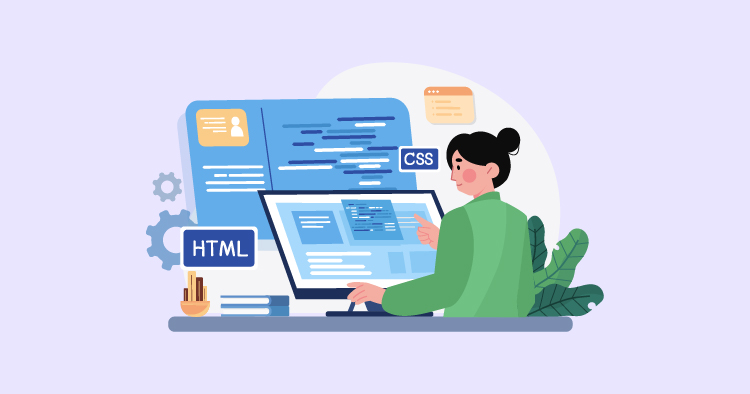Custom web portal development is a powerful tool for businesses that want to boost their online presence and make their operations more efficient. These portals meet a company’s needs, creating a special place where employees, customers, and suppliers can interact. They are a central spot for managing data, which helps everyone communicate and work together better. Custom portals with special features can also connect to other systems in ways that genuinely facilitate the growth of a business. They are flexible and can change as the business changes, which is something ready-made solutions often can’t do. Let’s inspect how custom web portal development can help a business progress.
Understanding Web Development for Small Businesses
Creating a solid online presence is essential for small businesses and web development plays a big part. Web development is all about building and maintaining websites, which could be anything from a simple page full of information to an intricate web application. Proper web development can help businesses reach more people, engage customers, and drive success.
Small businesses can take a few paths for web development. Some may go for template-based development, which uses pre-made designs. It’s quick and easy on the wallet. However, businesses can opt for custom web development, which builds the website from scratch to meet their needs. There’s also a middle ground—a hybrid approach that mixes custom elements with the speed of template use.
Deciding which route to take depends on what the business aims to achieve, how much they’re willing to spend, and how unique they want their website to be. While templates work for some, the personalized touch of custom development might be the key for businesses with specific needs.
The Advantages of Custom Web Portal Development
Going the custom route with web portal development means getting a product made just for your business. These aren’t one-size-fits-all solutions; they’re built to fit your business perfectly, streamlining your work and boosting productivity.
A big plus of custom portals is the user experience—they’re made with the user’s needs in mind. This focus on the user makes the portal easy to use, which keeps customers coming back.
Custom web portals also benefit your business by growing it. They’re flexible, so as your business changes or expands, the portal can change and grow, adding new features when needed. This adaptability makes custom web portals an intelligent choice for a business looking to grow and not wanting to be held back by its technology.
Key Features and Functionalities of Custom Web Portals
Custom web portals cater to the specific needs of businesses and their users. One essential feature of these portals is user registration and authentication. This ensures only users can access certain information, keeping the data secure and private. It’s also the foundation for creating a personalized experience for each user.
Select one of over 500 designs and establish your online presence.
- Free Web Hosting
- Fully Managed Solutions
- Scalable Websites
- No Hidden Cost
Personalization is another significant aspect. It lets users adjust their experience to match their preferences, increasing engagement and satisfaction. For example, users could set up a dashboard to show the information they use most frequently.
Seamless integration with other business systems and APIs is also a critical feature. It allows data to flow between the web portal and other software applications without interruption, improving efficiency and ensuring that information is up-to-date across all platforms.
Finally, secure data storage and management are non-negotiable. Strong security measures protect sensitive information and help businesses comply with data protection regulations, which is vital for maintaining user trust.
Web Development Technologies for Custom Web Portals
Creating a web portal’s user interface involves front-end technologies like HTML, CSS, and JavaScript. These building blocks shape the portal’s appearance and user interaction.
Conversely, back-end technologies like PHP, Ruby, and Python take care of what goes on behind the scenes. This includes processing user requests and managing interactions with the database, all of which contribute to the portal’s functionality and performance.
Databases are the backbone of a web portal, storing all user data and content. Depending on the project’s needs, developers might choose SQL databases like MySQL or NoSQL options like MongoDB for their flexibility and scalability.
Content management systems (CMS) are another piece of the puzzle. They allow people without technical expertise to update and manage the portal’s content. Integrating popular CMS platforms like WordPress or Drupal makes content management straightforward and user-friendly.
Choosing the Right Web Developer for Custom Web Portals
The right developer or team is paramount for building a custom web portal. You’ll want someone with the technical skills and a clear understanding of your business goals and how the portal can help achieve them.
Look for a developer with a solid track record. Their experience with similar projects, portfolios, and client feedback can tell much about their deliverability. Their technical skills are as necessary as how they communicate and work with you. After all, a successful project is often the result of a strong collaborative effort.
Select one of over 500 designs and establish your online presence.
- Free Web Hosting
- Fully Managed Solutions
- Scalable Websites
- No Hidden Cost
You should find a developer with technical expertise and willingness to understand and address your business needs. Excellent communication and a collaborative approach ensure your web portal project succeeds.
Types of Web Developers and Their Specializations
Web development is a vast field with specialists focusing on various aspects of website creation. Full-stack developers are the jacks of all trades in the web development world. They have the skills to work on a website’s front-end and back-end. This means they can create a complete web portal from scratch, handling everything from the design to the database.
Front-end developers are the artists of the web development world. They ensure that a website is functional and pleasing to the eye when you visit it. They work on the parts of the web portal that you interact with, ensuring that it’s easy to navigate and that everything looks good on different devices.
Back-end developers are like the wizards behind the curtain. They work on the server side, which you don’t see but is crucial for the website to function correctly. They manage databases, write server scripts, and ensure that all the web portal’s moving parts communicate seamlessly.
UI/UX designers are the architects of the web development process. They focus on how the web portal feels and how easy it is for users to accomplish their goals. They also design the website’s layout and flow, ensuring it’s intuitive and accessible for everyone.
Benefits of Collaborating with a Professional Web Development Agency
Choosing to work with a professional web development agency can offer many advantages. You get a complete team of specialists working together to build your web portal, each with their own skills. This means someone who knows what they’re doing crafts every element, from the design to the code.
These agencies come with a wealth of knowledge from working on various projects. They know what works and what doesn’t, so they can build a website that looks great and performs well. They’re up-to-date with the latest trends and best practices, ensuring your web portal stands out.
Professional agencies know how to deliver on time. They’re good at managing projects and have processes to keep everything on schedule. This is incredibly important if you’re planning a specific launch date or need to meet a deadline.
Cost Considerations for Custom Web Portal Development
The cost of building a custom web portal can vary greatly. It depends on what you need, how complex your project is, and the specific features you want to include if you’re looking for advanced features, like custom graphics or integrations with other systems, that will affect the price.
It’s crucial to balance staying within your budget and getting a quality website. Investing in a well-made web portal can pay off in the long run. An excellent website can make your operations more efficient, give your customers a better experience, and help you stand out online.
Thinking about the return on investment is crucial when considering the cost of your web portal. A custom website tailored to your business needs can streamline your work, engage your customers more effectively, and open up new opportunities for growth and revenue.
SEO and SERP Optimization for Custom Web Portals
Getting your web portal to appear in search engine results is critical to helping more people find your site. When your portal ranks higher, it’s like having a store in a busy part of town—more people walk by and might pop in to see what you offer.
To do this, start with on-page optimization. Make sure you use the right keywords—these are the words people type into search engines when they’re looking for something you offer. Also, remember to have clear and compelling meta tags; these are the bits of text that show up in search results and give people a sneak peek of your page. Since so many people browse the internet on their phones, your portal needs to work well on mobile devices.
But it’s not just about the technical stuff. Your content must be top-notch and exciting to your visitors. If you write articles, guides, or posts that people find helpful or entertaining, they’ll be likelier to click on your site, stick around, and even come back for more. Keep your content fresh by updating it regularly—this tells search engines that your site is active and relevant.
Measuring Success: Analytics and Performance Tracking
Knowing if your web portal is a hit involves monitoring specific numbers. Think of it like a dashboard in a car—you can see how fast you’re going, how much gas you have left, and whether you need to check the engine. For websites, you’ll want to monitor things like the number of people visiting your site (page views), the number of visits you get (user sessions), and the number of visits that turn into sales or sign-ups (conversion rates).
Understanding what your visitors do on your site is also crucial. This can show you which parts of your portal people like and where they might get stuck or lose interest. With this knowledge, you can tweak your design, content, and features to improve your site.
It’s important to keep refining your portal based on the data. This way, your site stays aligned with what your visitors want and your business aims to achieve. Plus, it helps you stay ahead of the competition.
Security Considerations for Custom Web Portals
When running a web portal, please keep it safe from hackers and breaches. Think of it as locking your doors and setting up an excellent security system to protect your home. You want to keep your visitors’ private information, such as addresses and payment details, safe.
Using SSL certificates and encryption is like having a secret code for messages between your visitors’ browsers and your server. Even if someone intercepts the messages, they won’t understand them. This is especially important if you handle sensitive data.
But security isn’t a one-time thing; it’s ongoing. Regularly check your website’s security to protect your business from new online threats. This means staying on top of the latest security trends and being ready to defend against new attacks. It’s a lot like keeping your vaccinations up to date—you want to be protected against the latest bugs.
Final Thoughts
Investing in custom web portal development can do wonders for a company’s productivity and place in the market. These tailor-made solutions meet a business’s specific needs, which means they can help create a better user experience, make the company more productive, and bring the brand together more powerfully. Custom portals can work with systems already in place and can change as the business grows. This makes them a smart choice for companies thinking about the future. As businesses keep working in a digital world, the value of these personalized solutions is becoming more apparent. Custom web portal development is crucial to how businesses plan for success.



